| Sei in: Cinema e Medioevo ® Indice alfabetico dei film |
| Sei in: Cinema e Medioevo ® Indice alfabetico dei film |
|
|
 |
a |
|
|
|
|
Shakespeare al cinema: Sir John Falstaff (Enrico IV, Enrico V, Le allegre comari di Windsor) - Il Medioevo di Orson Welles |
|||||
FALSTAFF
(Campanadas a medianoche)
1965, regia di Orson Welles
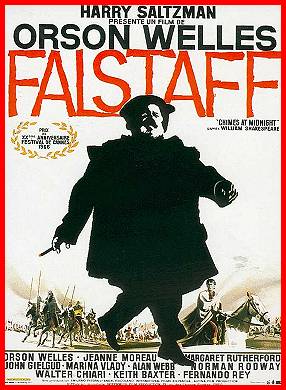
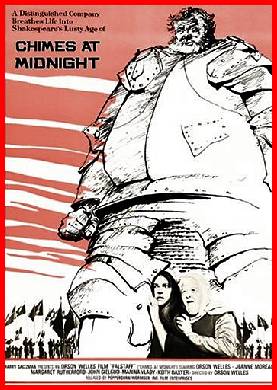
Scheda: Nazione: Spagna-Svizzera - Produzione: Alpine Films, Internacional Films Española - Distribuzione: INC, Peppercorn-Wormser - Soggetto (dalle opere di William Shakespeare, e dal volume Chronicles of England, Scotlande, and Irelande di Raphael Holinshed): Orson Welles - Sceneggiatura: Orson Welles - Fotografia: Edmond Richard - Montaggio: Fritz Muller, Elena Jaumandreu, Peter Parasheles - Scenografie: José Antonio de la Guerra - Costumi: Orson Welles - Musiche: Angelo Francesco Lavagnino - Formato: Panoramica, B.N. - Durata: 113' (120').
Cast: Orson Welles, Jeanne Moreau, Margaret Rutherford, John Gielgud, Marina Vlady, Walter Chiari, Fernando Rey, Michael Aldridge, Julio Peña, Tony Beckley, Andrés Mejuto, Keith Pyott, Jeremy Rowe, Alan Webb, Keith Baxter, Norman Rodway, José Nieto, Andrew Faulds, Charles Farrell, Fernando Hilbeck, Patrick Bedford, Beatrice Welles, Ralph Richardson (voce narrante).
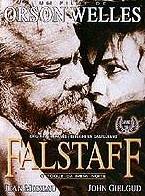
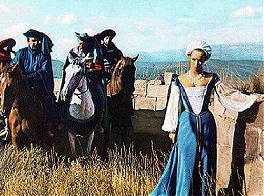
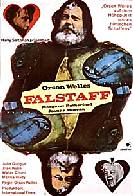
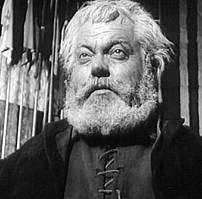
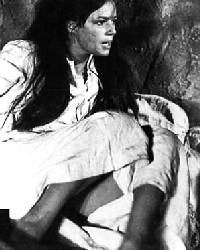
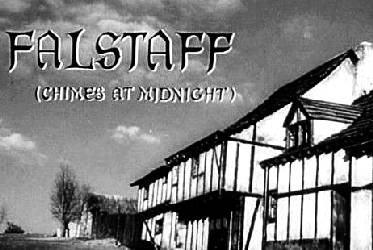
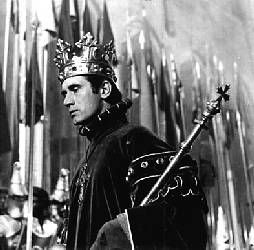
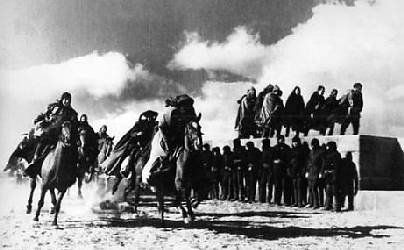
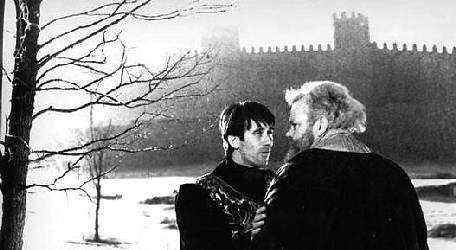
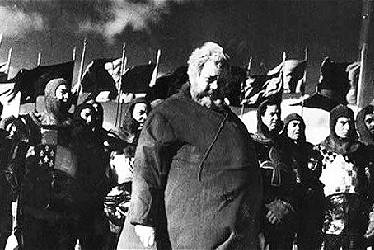
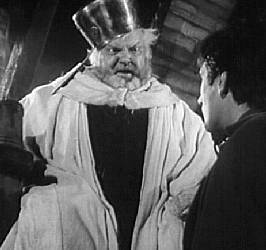
![]() Trama e commenti: cinematografo.it
- kataweb.it
-
mymovies.it
- ips.it/cinethes:
«"Un giorno abbiamo girato la scena del corteo dell'incoronazione di Enrico V; quando l'abbiamo vista, Orson ha detto:
'La voglio rifare da un'altra angolazione. Troverò io una chiesa vicino a
Madrid'. Solo che mentre la scena girata si svolgeva tutta da sinistra verso destra, in quella chiesa potevamo riprendere solo da destra a sinistra, a causa degli sfondi. L'ho fatto notare a Orson e l'ho portato sul posto per mostrargli le difficoltà. Allora lui ha detto: 'Bene! Giriamo e poi rovesciamo la
pellicola'. Così ho dovuto istruire gli attori, Enrico V ha portato l'orba nell'altra mano, le giacche hanno avuto l'abbottonatura spostata e le asole invertite, le armi cambiate di lato. Gli spagnoli hanno pensato che fossimo impazziti, ma noi l'abbiamo girata così e poi abbiamo rovesciato tutto in stampa. Questo era
Orson" (Alessandro Tasca di Cutò)».
Trama e commenti: cinematografo.it
- kataweb.it
-
mymovies.it
- ips.it/cinethes:
«"Un giorno abbiamo girato la scena del corteo dell'incoronazione di Enrico V; quando l'abbiamo vista, Orson ha detto:
'La voglio rifare da un'altra angolazione. Troverò io una chiesa vicino a
Madrid'. Solo che mentre la scena girata si svolgeva tutta da sinistra verso destra, in quella chiesa potevamo riprendere solo da destra a sinistra, a causa degli sfondi. L'ho fatto notare a Orson e l'ho portato sul posto per mostrargli le difficoltà. Allora lui ha detto: 'Bene! Giriamo e poi rovesciamo la
pellicola'. Così ho dovuto istruire gli attori, Enrico V ha portato l'orba nell'altra mano, le giacche hanno avuto l'abbottonatura spostata e le asole invertite, le armi cambiate di lato. Gli spagnoli hanno pensato che fossimo impazziti, ma noi l'abbiamo girata così e poi abbiamo rovesciato tutto in stampa. Questo era
Orson" (Alessandro Tasca di Cutò)».
![]() Plot Summary, Synopsis, Review: IMDb
-
flixster.com
-
dvdbeaver.com
-
entertainment.msn.com
- tvguide.com
- elcultural.es
- allwatchers.com
- learmedia.ca:
«This is one of the great Shakespearean adaptations and a true 'lost classic'. It's also the last masterpiece that Orson Welles directed in his lifetime, and with
Citizen Kane, Magnificent Ambersons and Touch of Evil comprises a quartet of major cinematic works that he
accomplished. The film is an inventive re-editing and condensation of Shakespeare's plays, spanning from the end of Richard II to the beginning of Henry V. The film focuses on the character of Jack Falstaff, played by Welles himself in a virtuoso performance. Falstaff's relationship with young Prince Hal (later Henry V) is explored, and uncannily parallels Welles' own experience with the young talents of Hollywood.
Chimes at Midnight can be a jarring experience due to inconsistent film quality, low budget sets and Welles' flair for shock cuts, but it's a truly rewarding experience once you adapt to the style and
limitations. There are several great performances, by John Gielgud as Henry IV, Keith Baxter as Hal and Norman Rodway as Hotspur, who seems like a predecessor to Kenneth
Branagh. Chimes at Midnight has a little of everything: low comedy, highly artistic camera angles, exciting battle scenes (the battle of Shrewesbury scene influenced Braveheart) and a deeply moving story that Welles has 'discovered' between the lines of Shakespeare's
histories».
Plot Summary, Synopsis, Review: IMDb
-
flixster.com
-
dvdbeaver.com
-
entertainment.msn.com
- tvguide.com
- elcultural.es
- allwatchers.com
- learmedia.ca:
«This is one of the great Shakespearean adaptations and a true 'lost classic'. It's also the last masterpiece that Orson Welles directed in his lifetime, and with
Citizen Kane, Magnificent Ambersons and Touch of Evil comprises a quartet of major cinematic works that he
accomplished. The film is an inventive re-editing and condensation of Shakespeare's plays, spanning from the end of Richard II to the beginning of Henry V. The film focuses on the character of Jack Falstaff, played by Welles himself in a virtuoso performance. Falstaff's relationship with young Prince Hal (later Henry V) is explored, and uncannily parallels Welles' own experience with the young talents of Hollywood.
Chimes at Midnight can be a jarring experience due to inconsistent film quality, low budget sets and Welles' flair for shock cuts, but it's a truly rewarding experience once you adapt to the style and
limitations. There are several great performances, by John Gielgud as Henry IV, Keith Baxter as Hal and Norman Rodway as Hotspur, who seems like a predecessor to Kenneth
Branagh. Chimes at Midnight has a little of everything: low comedy, highly artistic camera angles, exciting battle scenes (the battle of Shrewesbury scene influenced Braveheart) and a deeply moving story that Welles has 'discovered' between the lines of Shakespeare's
histories».
![]() Approfondimenti: Movie
Review
Approfondimenti: Movie
Review
Conosciuto anche con il titolo: Chimes at Midnight.